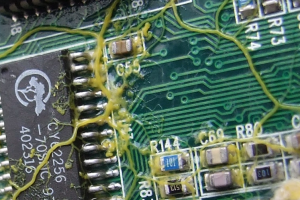How slime mold can design transportation networks and maybe even transform computing
By Biz Carson, http://gigaom.com
The yellow blobs of slime mold normally grow in dark forests, not on computer chips or on gelatinous squares shaped like the United States. But through his research, University of the West of England professor Andrew Adamatzky has shown that the mold can, and should, be grown elsewhere because of its potential in computing.
Physarum polycephalum is a brainless mold that’s sole purpose is to build transportation networks for the nutrients that sustain it. As it expands in search of food, it sends out slimy tubes that continue to branch out until it finds a food source, at which point it forms a blob around the nutrients. Its slime tubes then continue to grow and split until the mold forms a network of tubes to transport the food throughout itself.
The key to Physarum polycephalum’s computing power, however, is its ability to form the most efficient and optimal network.
Because it’s a self-repairing, living creature, it can also model emergency situations. So if a road was cut off due to flooding or an accident, the mold could also be suddenly cut off at that point and its resources redirected in another optimal way.
“By understanding how living creatures build transport networks, an urban planner would probably modify their approaches towards urban development and road planning,” Adamatzky said.
And while we may not see a petri dish of slime mold on an urban planner’s desk anytime soon, there are more practical applications of the mold when it comes to computing. Adamatzky wrote a book in 2010 where he defined the concept of Physarum machines: programmable, amorphous, living computing devices. Because the mold is sensitive to light and certain chemicals, the mold can be programmed to travel certain ways while still finding the optimal network. Read More
Posted on May 21, 2014, in Education, Microbiology, Mold and tagged environmental, Microbial Science, Microbiology, Mold, Slime mold. Bookmark the permalink. Leave a comment.

Leave a comment
Comments 0